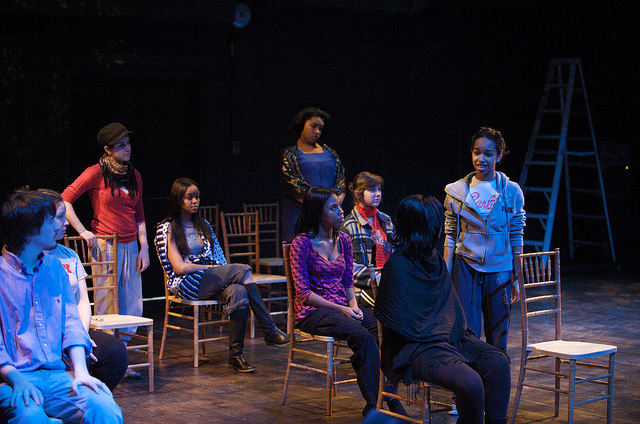Talking drama into being: types of talk in drama classrooms
DOI:
https://doi.org/10.31273/eirj.v1i1.76Abstract
This paper explores the structure of talk in drama classrooms, particularly the ways students and teachers use different kinds of talk to achieve their classroom work and construct shared moral reasoning as the basis of their practical educational activities. The data and discussion presented here bring together the curricular setting of educational drama and the methodological setting of Conversation Analysis and Membership Categorisation Analysis. The transcripts and analyses emerged from a larger study that sought to explore the particular ways students interacted within process drama lessons dealing with future life prospects and pathways. The identification of three distinct kinds of talk has significance for education scholars, teacher-educators and teacher-practitioners as it has the potential to enable a more detailed awareness of the structure of classroom practice and the particular ways students engage with significant ideas in classroom settings.
Downloads
References
Austin, H., Dwyer, B. & Freebody, P., 2003. Schooling the child: The making of students in classrooms. London: Routledge-Falmer.
Boal, A., 1979. Theatre of the oppressed. London: Pluto Press.
Bolton, G., 1998. Acting in Classroom Drama. Staffordshire: Trentham Books.
Bowell, P & Heap, B., 2001. Planning Process Drama. London: David Fulton Publishers.
Drew, P. & Heritage, J., 1992. Analyzing talk at work: an introduction. In P. Drew & J. Heritage, eds. Talk at work: Interaction in institutional settings. Cambridge: Cambridge University Press, p. 3-65.
Eglin, P. & Hester, S., 1992. Category, predicate and task: The pragmatics of practical action. Semiotica, 88, p. 243–68.
Freiberg, J. & Freebody, P., 1995. Analysing literacy events in classrooms and homes: Conversation-analytic approaches. In P. Freebody, C. Ludwig, & S. Gunn, Everyday literacy practices in and out of schools in low socioeconomic urban communities. Report to the Commonwealth Department of Employment, Education and Training. Melbourne: Curriculum Corporation, p. 185-372.
Heap, J. L., 1990. Applied Ethnomethodology: Looking for the local rationality of reading activities. Human Studies, 13 p, 36-72.
Healthcote, D. & Herbert, P., 1985. A drama of learning: Mantle of the expert. Theory into practice, 24(3), p. 173-180.
Heritage, J., 1984. Garfinkel and Ethnomethodology. Cambridge UK: Polity Press.
Hutchby, I. & Wooffitt, R., 1998. Conversation analysis. Cambridge: Polity Press.
Jayyusi, L., 1984. Categorisation and the moral order. Boston: Routledge & Kegan Paul.
Kao, S. & O’Neill, C., 1998. Words into worlds: learning a second language through process drama. Ablex publishing Corporation, Stanford.
Lee, Yo-An (2004) 'The work of examples in classroom instruction', Linguistics and Education 15: 99-120
Lee, Yo-An (2007) 'Third turn position in teacher talk: Contingency and the work of teaching', Journal of Pragmatics, 39 (6): 1204-1230
Macbeth, D., 2000. Classrooms as instillations: Direct instruction in the early grades. In S. Hester & D. Francis, eds. Local educational order: Ethnomethodological studies of knowledge in action. Amsterdam: John Benjamins Publishing Company, p. 21-72.
Macbeth, D., 1996. The discovery of situated worlds: Analytic commitments or moral orders? Human studies, 19, p, 267-87.
Mehan, H., 1985. The structure of classroom discourse. In T. A. van Dijk, ed. Handbook of discourse analysis. London: Academic, p. 119-131.
O’Neill, C. 1995. Drama worlds: A framework for process drama. Portsmouth, NH: Heinemann.
O’Toole, J., 1992. The process of drama: Negotiating art and meaning. London: Routledge.
Sacks, H., 1992. Lectures on Conversation. Edited by G. Jefferson. Oxford: Blackwell.
Sacks, H. Schegloff, E.A. & Jefferson, G., 1974. A simplest systematics for the organization of turn-taking for conversation. Language 50, p. 696–735.
Schegloff, E., 2007. Sequence organisation in conversation A primer in conversation analysis. Volume 1. Cambridge: Cambridge University Press.
Sinclair, J. & Coulthard, M., 1975. Towards an Analysis of Discourse. Oxford: Oxford University Press.
Taylor, P. & Warner C. D., 2006. Structure and Spontaneity: The process drama of Cecily O’Neill. Stoke on Kent: Trentham.
ten Have, P., 1999. Doing conversation analysis: A practical guide. London: Sage.
Wagner, B.J., 1979. Dorothy Heathcote: Drama as a learning medium. London: Hutchinson and Co Ltd.

Published
Issue
Section
License
Authors who publish with this journal agree to the following terms:
Authors retain copyright and grant the journal right of first publication with the work simultaneously licensed under a Creative Commons Attribution License (CC-BY), which permits use and redistribution of the work provided that the original author and source are credited, a link to the license is included, and an indication of changes which were made. Third-party users may not apply legal terms or technological measures to the published article which legally restrict others from doing anything the license permits.
If accepted for publication authors’ work will be made open access and distributed under a Creative Commons Attribution (CC-BY) license unless previously agreed with Exchanges’ Editor-in-Chief prior to submission.
Authors are able to enter into separate, additional contractual arrangements for the non-exclusive distribution of the journal's published version of the work (e.g., post it to an institutional repository or publish it in a book), with an acknowledgement of its initial publication in this journal.
Authors are permitted and encouraged to post their work online (e.g., in institutional repositories or on their website) prior to and during the submission process, as it can lead to productive exchanges, as well as earlier and greater citation of published work. (see: The Effect of Open Access)
